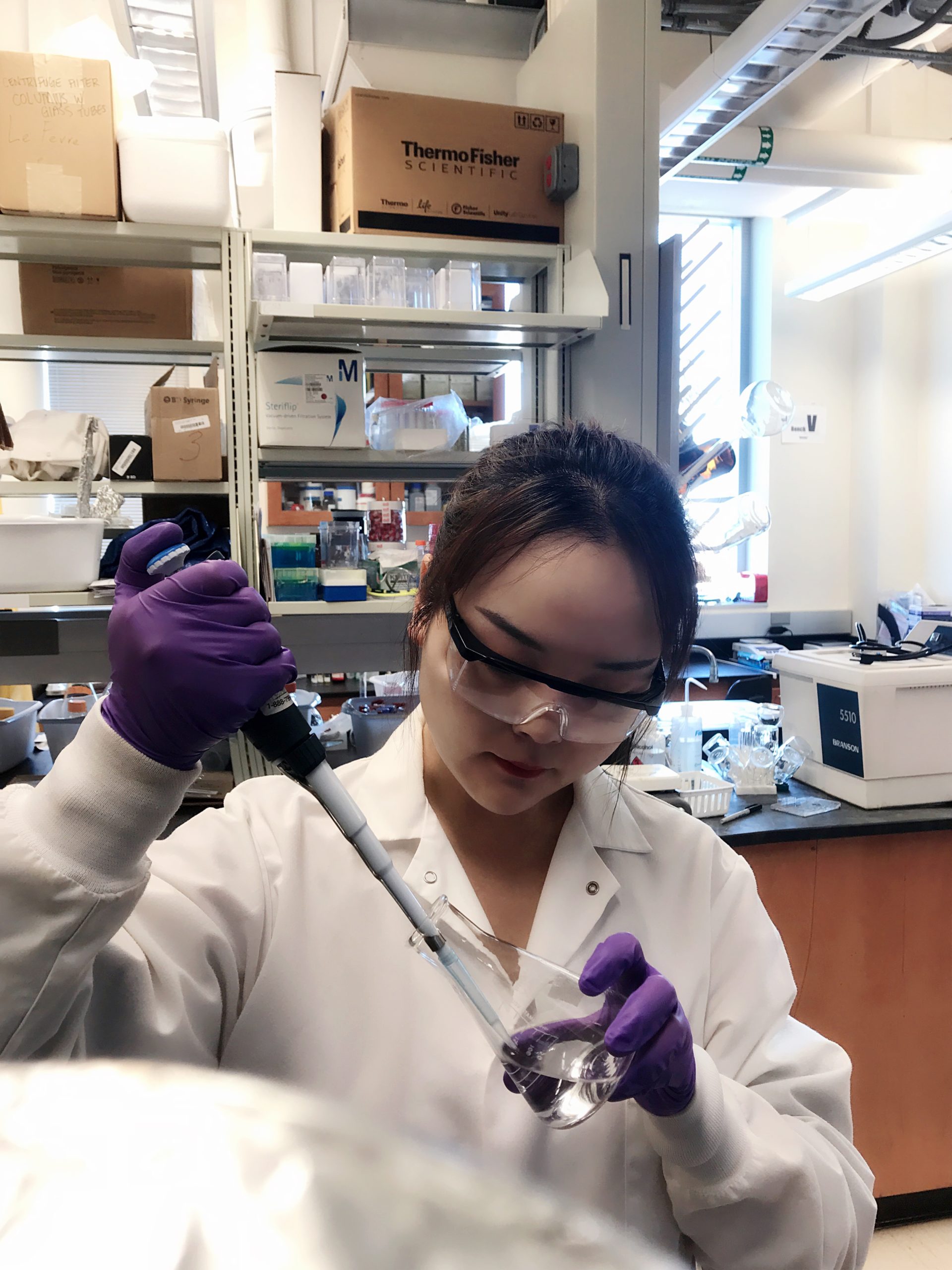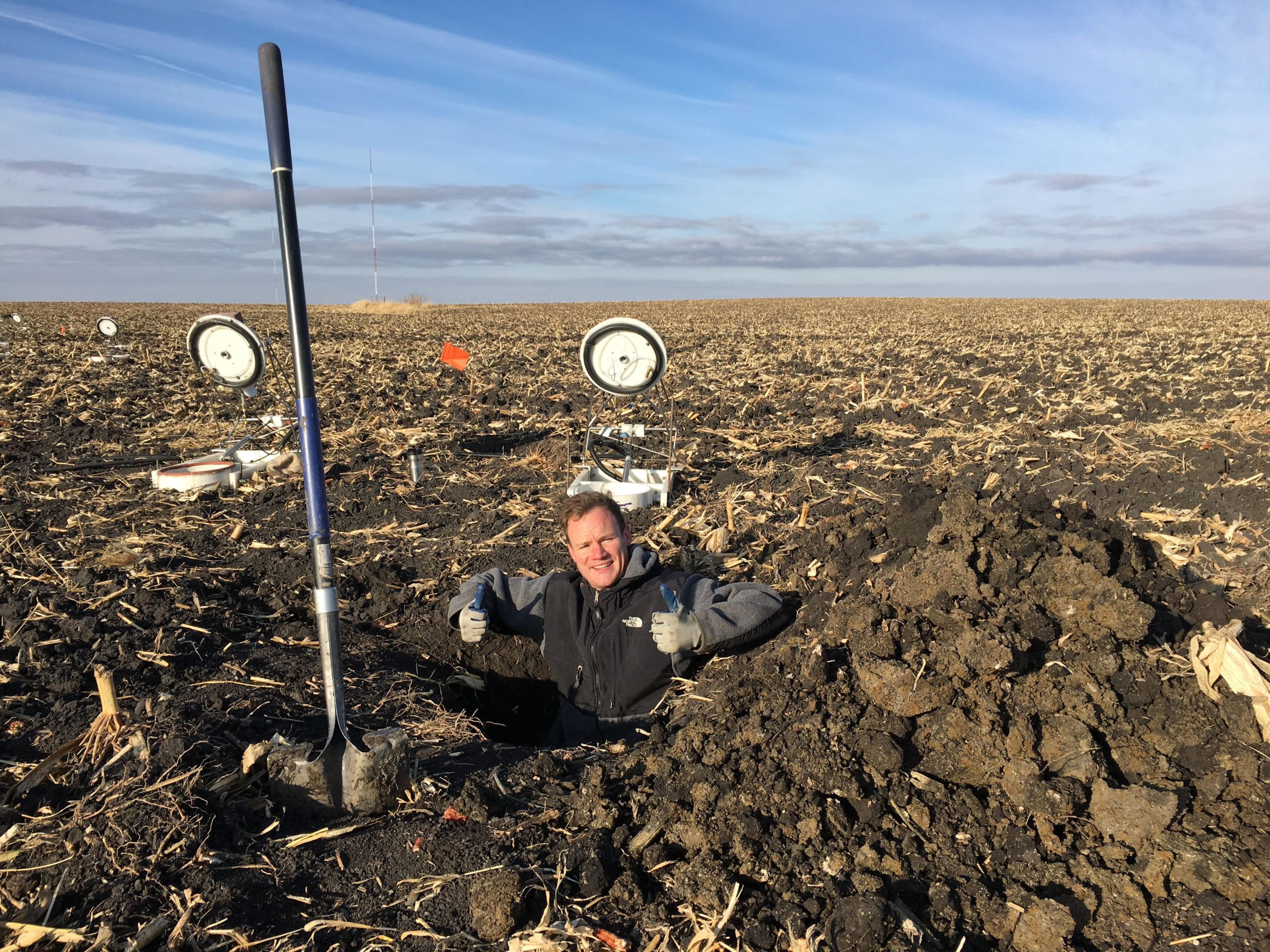Midwestern row-crop agriculture is recognized as being highly productive, but is also cited for impairing surrounding ecosystems and impacting environmental quality. Water quality is a key metric utilized to characterize the health of an agricultural watershed. Therefore, it is important to know how new or alternative management practices impact water quality. With this in mind, the Kansas Agricultural Watershed (KAW) Field Laboratory was created in 2014 to study the effects of agricultural systems on water, sediment and nutrient losses. The goal of the KAW field lab is to evaluate and develop sustainable conservation practices that protect water quality, maintain yield and profitability and provide producers with flexible options for management of crops and nutrients.
Continue reading2019 One Water Summit
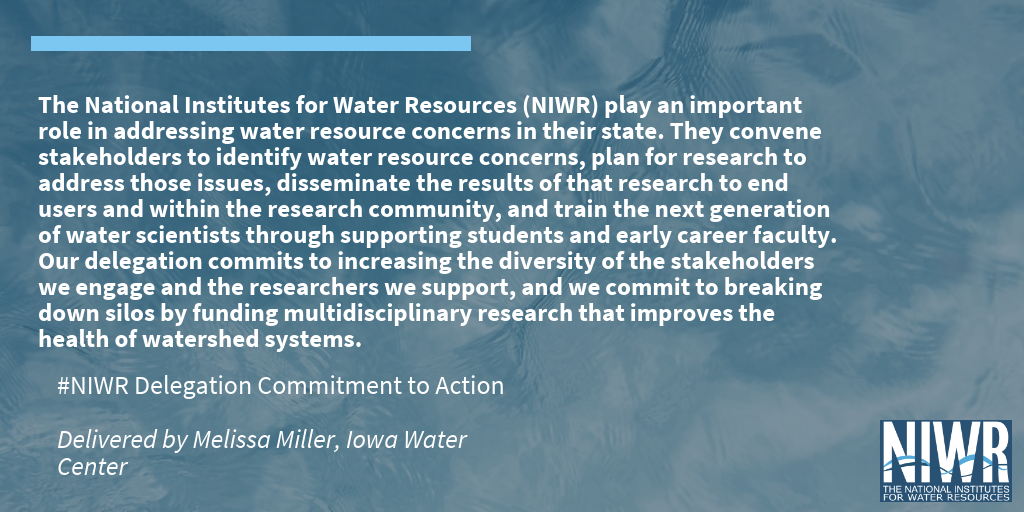
This year, several member institutes of the National Institutes for Water Resources (NIWR) attended the One Water Summit in Austin, Texas as a delegation. At the end of the conference, each delegation provided a commitment to action for what goals they seek to achieve over the next year.
NIWR’s commitment to action was delivered by Melissa Miller, Associate Director for the Iowa Water Center (see image above).
Ask a Scientist – Environmental History
We ask Joe Otto, PhD Candidate at the University of Oklahoma and Historian for SWCS: What is environmental history?
Continue readingResearchers Looking into the Effects of Pharmaceuticals on Fish in Iowa’s Waterways
Written by Sarah Feehan
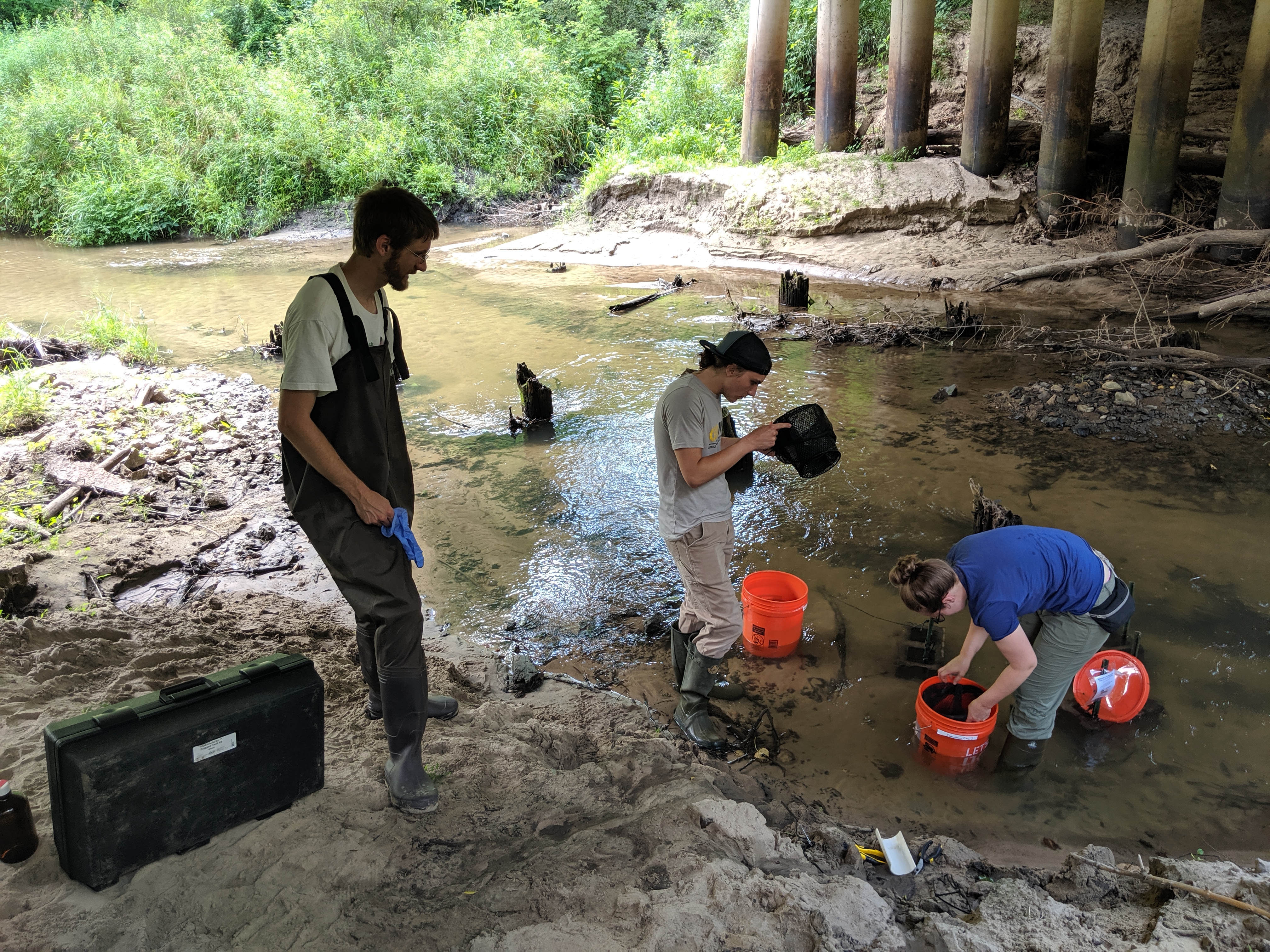
Lab-reared, native minnows have been living in fish cages placed in a stream for the last four days, and now a team of researchers collects them to study the impacts of water quality on aquatic organisms.
For nearly the past two years, these researchers have been measuring chemical concentrations in the same stream, and this caged fish experiment is one of the ways researchers are connecting chemical presence in the environment to possible biological effects.
Greg LeFevre, an assistant professor of environmental engineering and faculty research engineer for IIHR at the University of Iowa, studies water quality, wastewater, and toxic substances.
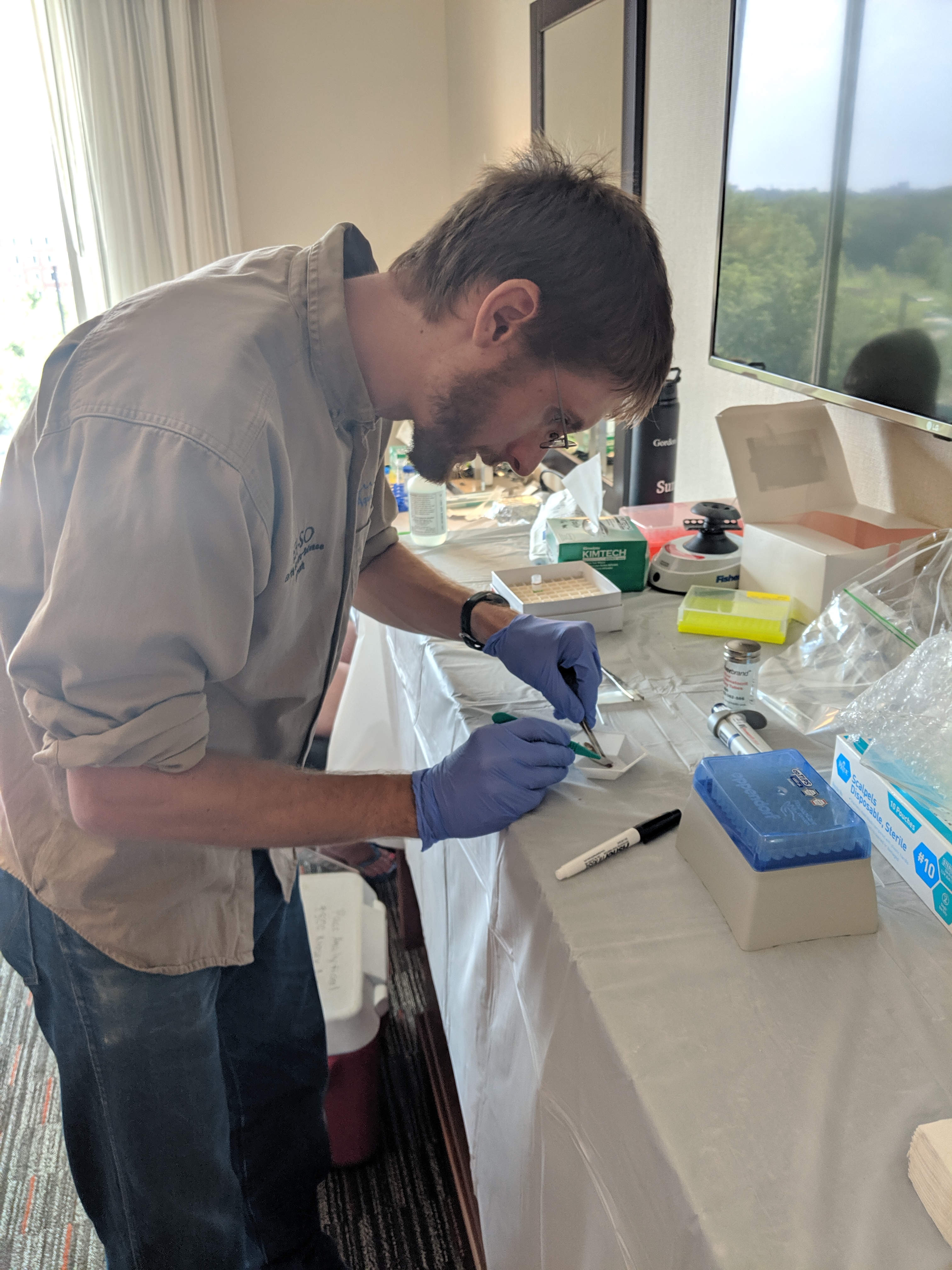
LeFevre, a principal investigator (PI) of the study, is researching what happens when pharmaceuticals enter our waterways. His research is funded through a National Competitive Grant under the USGS 104(g) Program. A goal of this program is to promote collaboration between the USGS and university scientists in research on significant national and regional water resources issues.
This working group consisted of representatives from the University of Iowa, the University of Wisconsin at Milwaukee, and the United States Geological Survey (USGS). There were PIs, graduate students, and USGS scientists.
“We have a number of different things we are working on both in the lab and in the field to try and answer the questions comprehensively through multiple fields of expertise,” LeFevre says. “And out of this one grant, because there are so many things coming out of this, we hope that this field site will be the locus for a bunch of other research.”
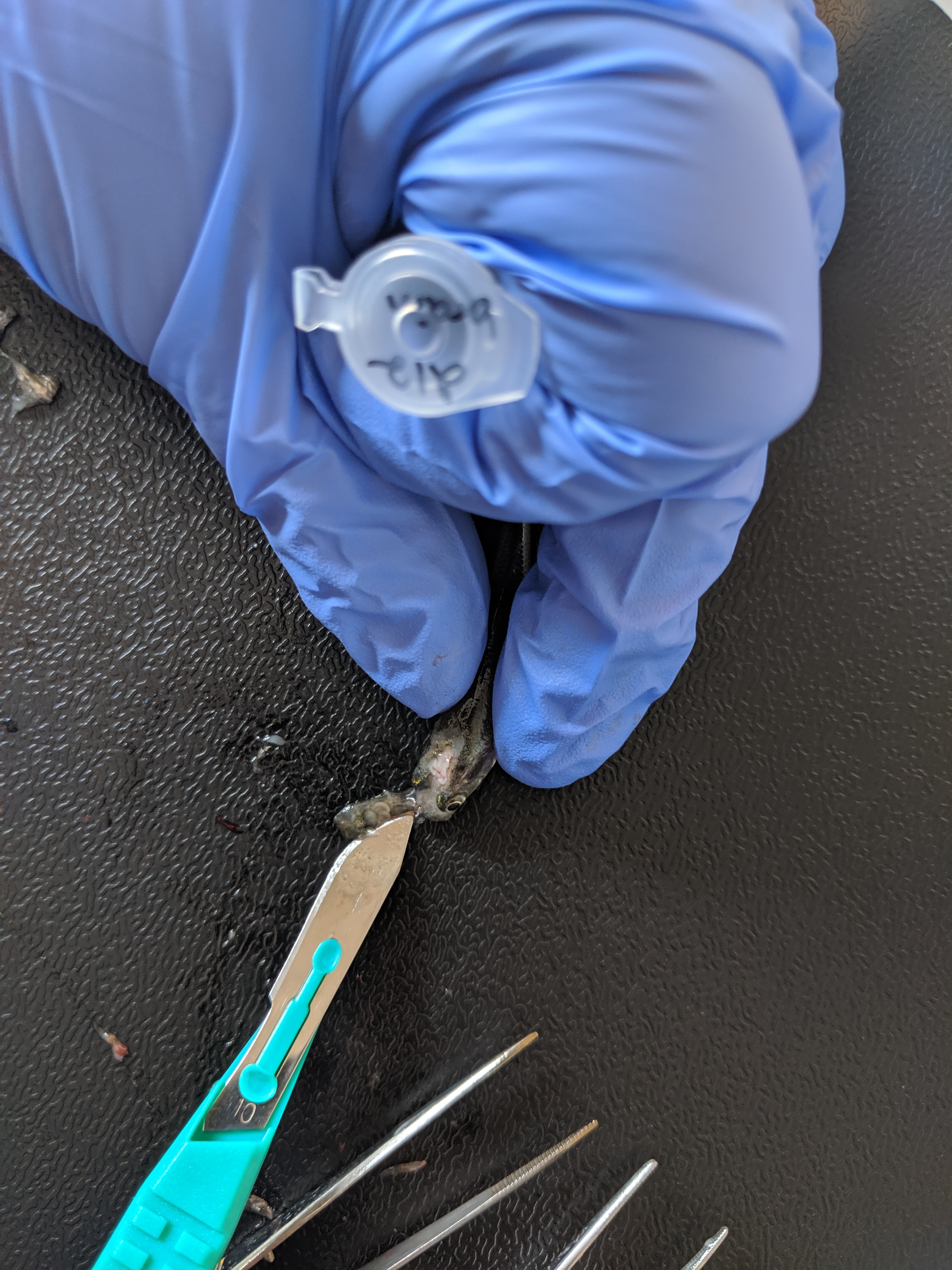
Wastewater-derived contaminants of emerging concerns (CEC) have demonstrated harmful effects to aquatic organisms. LeFevre believes that there is a critical need to understand how the changing complex mixture composition of CECs relates to biological effects. This understanding is critical in order to better protect ecosystem health in freshwater resources and inform stakeholder decisions.
“Everything that happens on the land is ultimately very connected to what goes on and into the water,” says LeFevre. “What we want to do is to develop some kind of understanding of the exposure to fish as well as some of the biological facts that are going on there.”
They hope to see the effects on fish throughout different areas of the stream. They will study a control group that permanently remains at the lab, a different group released in cages in the waterway after being brought up in the lab, and native fish who have spent their whole lives in the natural stream.
The waterway they are putting fish in and pulling fish from comes from an upstream wastewater treatment facility LeFevre describes as, “one of the best in the state.”
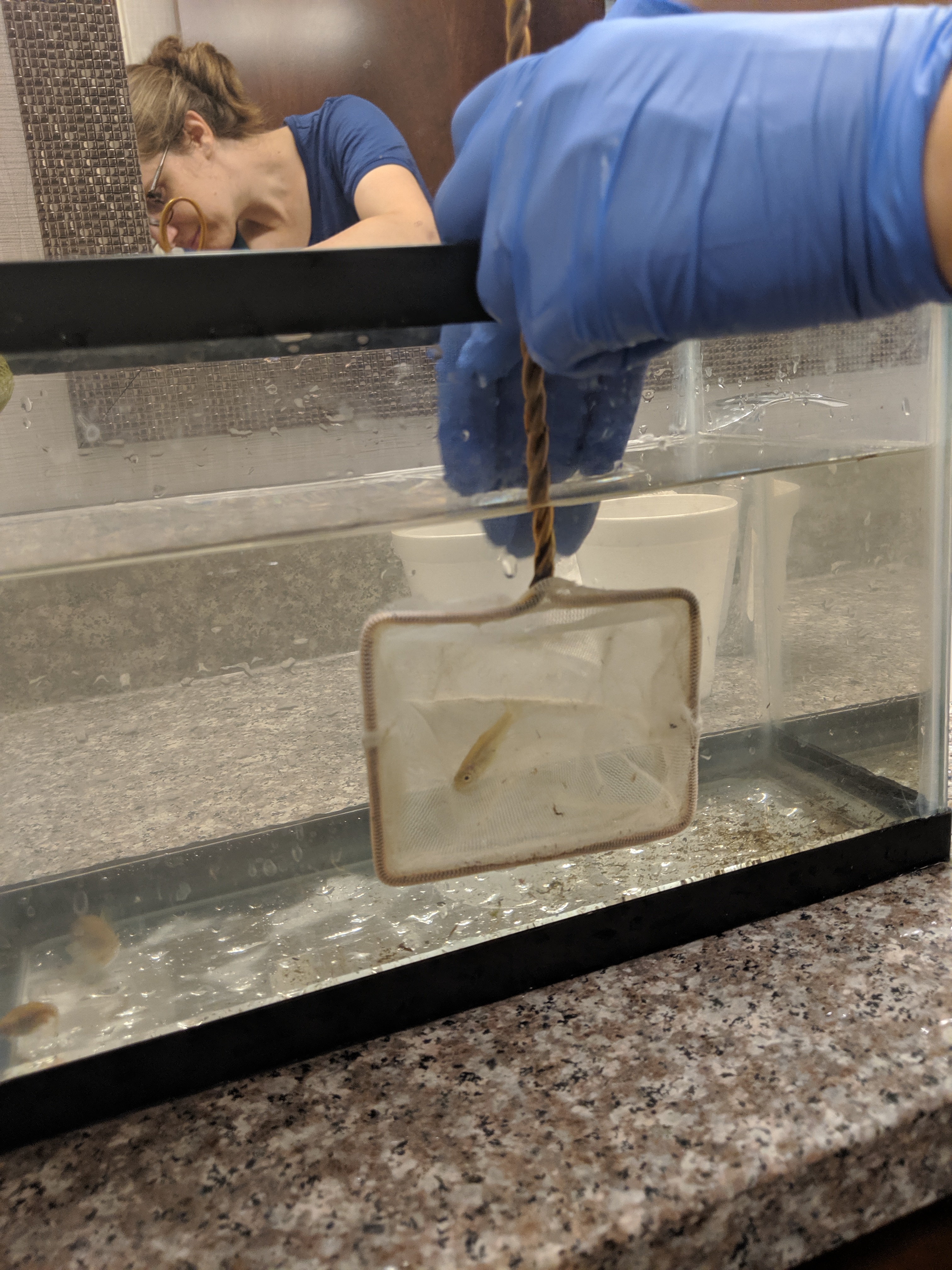
The North Liberty Wastewater Treatment Plant, upstream of the tested waterway, has a membrane bioreactor, zero E. coli that comes out of the plant, and biological phosphorus and nitrogen removal. All of which is far beyond the permit requirements.
Rebecca Klaper, professor at the School of Freshwater Sciences at the University of Wisconsin at Milwaukee, is a co-principal investigator on the study has also been a key collaborator to LeFevre’s research.
Regarding the data, Klaper explains, “The detection part is fantastic and the fact that we’ve gotten so much better at measuring these things is great. We might detect hundreds of chemicals in the water, but they might have no effect at all. So, the other part is trying to figure out if we really need to be concerned about them.”
“Today has been really exciting,” PhD candidate and research assistant at the University of Iowa Hui Zhi says. Zhi is one of four Iowa Water Center (IWC) Graduate Student Research Competition recipients for 2019.
“I think we were overprepared, which is great,” she says. “Having everything ready to go makes our work more efficient. And we also have so many people from our labs working together, making everything work very smoothly.”
Part of Zhi’s research through the IWC grant encompasses the sorption and biodegradation of pharmaceuticals in Iowa’s water. “It’s important we understand what’s in our drinking water, what’s in the treated wastewater, and what’s in the streams and rivers,” Zhi says.

Sarah Feehan is the communications specialist for the Iowa Water Center. She holds a BS in Journalism and Mass Communication with a minor in Political Science from Iowa State University. In fall of 2019, Feehan will begin acquiring her JD from Drake Law School.
Zhi Selected as a Recipient for the Iowa Water Center’s Institute Research Grant Competition
Written by Sarah Feehan, Communications Specialist
AMES, IOWA – The Iowa Water Center (IWC) annually administers a statewide grant competition known as the IWC Graduate Student Research Competition.
The purpose of this funding is to enable graduate students to complete additional research objectives beyond the scope of their current work, with an emphasis on submitting their research to peer-reviewed publications.
Hui Zhi has been selected among three other graduate students from across Iowa. She and the other recipients will receive funding for a variety of proposed research.

Zhi’s proposed research encompasses sorption and biodegradation of pharmaceuticals in Iowa’s water. It is titled ‘Quantifying Differential Sorption and Biodegradation of Pharmaceuticals in a Wastewater Effluent-dominated Stream in Iowa’.
Associate Director of the IWC Melissa Miller says, “Water Resources Research Institutes like the Iowa Water Center were authorized by Congress in part to address emerging water resources concerns through research. The fate and transport of pharmaceuticals in our water is of critical interest to both the state and region, and we look forward to sharing the results of Ms. Zhi’s work.”
“From this research, we’ll better understand the fate and transformation of pharmaceuticals in the surface water. It’s important we understand what’s in our drinking water, what’s in the treated wastewater, and what’s in the streams and rivers. And, how they change spatially and temporally,” Zhi says.
Get to Know Hui Zhi, PhD Candidate at the University of Iowa
Typically, Zhi wakes up around 6:30 A.M. and makes herself breakfast and a cup of black coffee. Once at her office, she checks emails and reads journal article updates.
One early morning in her office, Zhi received an email about the IWC’s grant competition and thought, “it would be a really great opportunity to apply for.” She spoke to her adviser about the competition and he encouraged her to write and submit a proposal.
“It caught my eye,” Zhi says of the grant competition email. Zhi’s research from this grant work will be a one-year study that employs both field and laboratory research approaches.
Zhi says, “I really enjoy working in the lab and look forward to getting the results.”
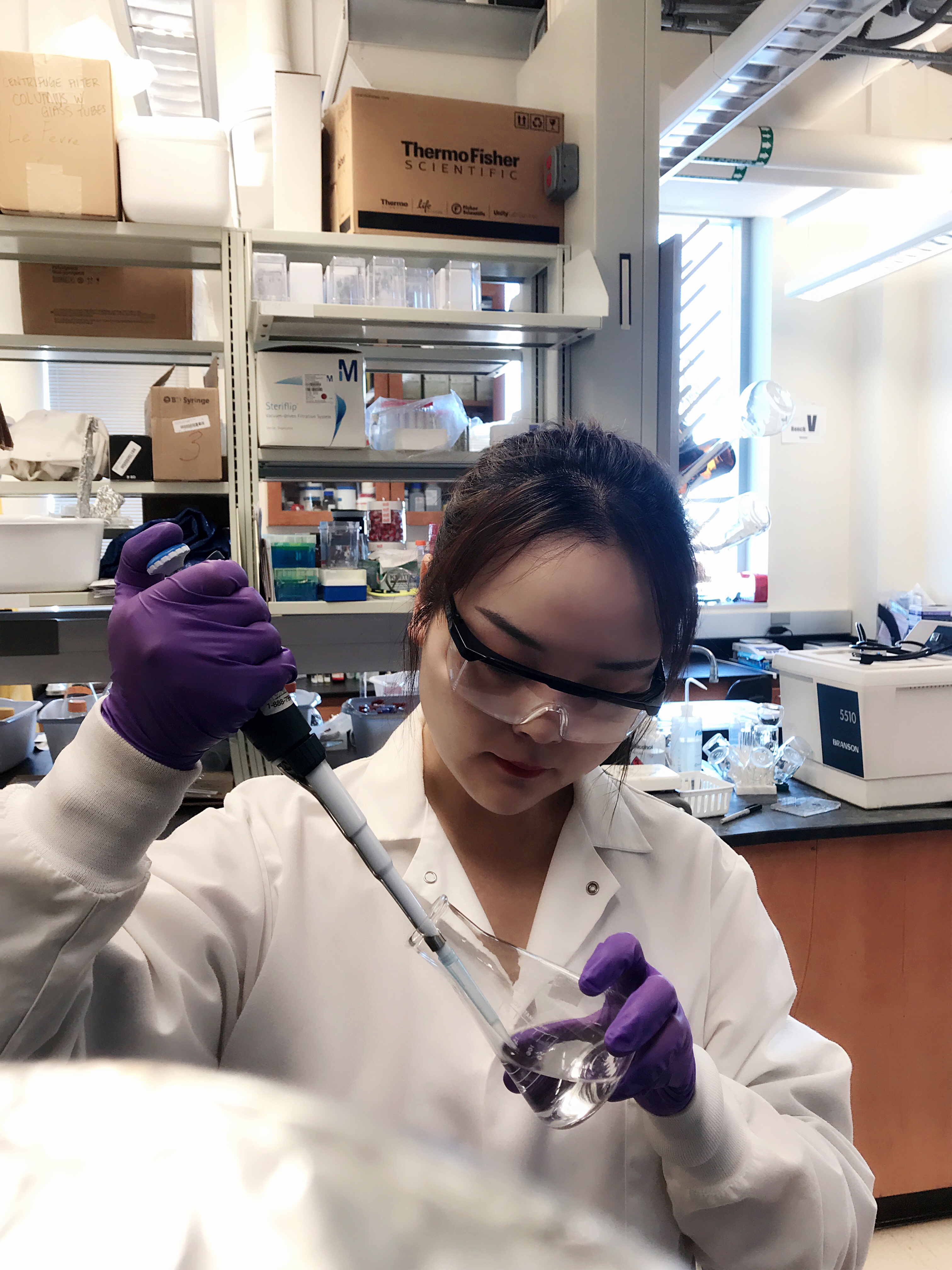
Zhi grew up in China, where she completed her bachelor’s degree in an environmental science program at China Pharmaceutical University.
The environmental crisis in China influenced Zhi to continue school and to focus on environmental engineering. She decided to continue her studies here in the United States, where Zhi believes, “the best programs in the world for environmental engineering are at.”
She received her master’s degree at Cornell University and is now a PhD candidate at the University of Iowa. Her anticipated completion year is 2020.
With her research, Zhi hopes people will better understand the behaviors of pharmaceutical mixtures in the water and their associated ecological impacts.
She explains, “The results will be able to help the right people, whoever is responsible for our water policy regulations, set in place science-based water quality regulations for pharmaceuticals. Regulations not just for our drinking water, but also in the treated wastewater that is discharged into our environment. Hopefully then, we will have a cleaner water environment.”
Instead of just focusing solely on the quality of our drinking water, Zhi thinks knowing what’s going on in all our water systems, for example streams and rivers, is vital to a healthy environment.
Pharmaceuticals can have impacts on aquatic species, such as fish, living in the water. If pharmaceuticals are accumulating in fish and people are eating these fish, the accumulation of pharmaceuticals ends up in human bodies.
Therefore, not only are we drinking pharmaceuticals, but we are also eating fish that have been accumulating pharmaceuticals over time. “People need to know what’s happening in the streams nearby that they’re swimming in and also in the waters their fish are found because there are potential impacts on the human body that we don’t clearly know yet,” Zhi says.
To help prevent research burnout, Zhi enjoys exercising. “Whether it’s cardio, yoga, boxing, rock climbing, or swimming, I love it. All these different sports help relieve any pressure from research, and I have a lot of fun doing them,” Zhi says.
For more information about this year’s recipients, please visit https://iawatercenter.wordpress.com/. To reference the general press release for all four recipients, please visit: http://www.water.iastate.edu/news/iowa-water-center-announces-2019-grant-recipients.
The Iowa Water Center is a federally funded organization, part of the National Institutes for Water Resources. Located on the Iowa State University campus, it is one of 54 institutes located throughout the United States and U.S territories. The purpose of the Iowa Water Center is to identify water-related research needs, provide outreach and education opportunities, and disseminate information about Iowa’s water resources to the public to form better policies and everyday practices. Learn more at https://www.water.iastate.edu/.
 Sarah Feehan is the communications specialist for the Iowa Water Center. She holds a BS in Journalism and Mass Communication with a minor in Political Science from Iowa State University. In fall of 2019, Feehan will begin acquiring her JD from Drake Law School.
Sarah Feehan is the communications specialist for the Iowa Water Center. She holds a BS in Journalism and Mass Communication with a minor in Political Science from Iowa State University. In fall of 2019, Feehan will begin acquiring her JD from Drake Law School.
Lawrence Selected as a Recipient for the Iowa Water Center’s Institute Research Grant Competition
Written by Sarah Feehan, Communications Specialist
AMES, IOWA – The Iowa Water Center (IWC) annually administers a statewide grant competition known as the IWC Graduate Student Research Competition.
The purpose of this funding is to enable graduate students to complete additional research objectives beyond the scope of their current work, with an emphasis on submitting their research to peer-reviewed publications.
Nate Lawrence has been selected among three other graduate students from across Iowa. He and the other recipients will receive funding for a variety of proposed research.
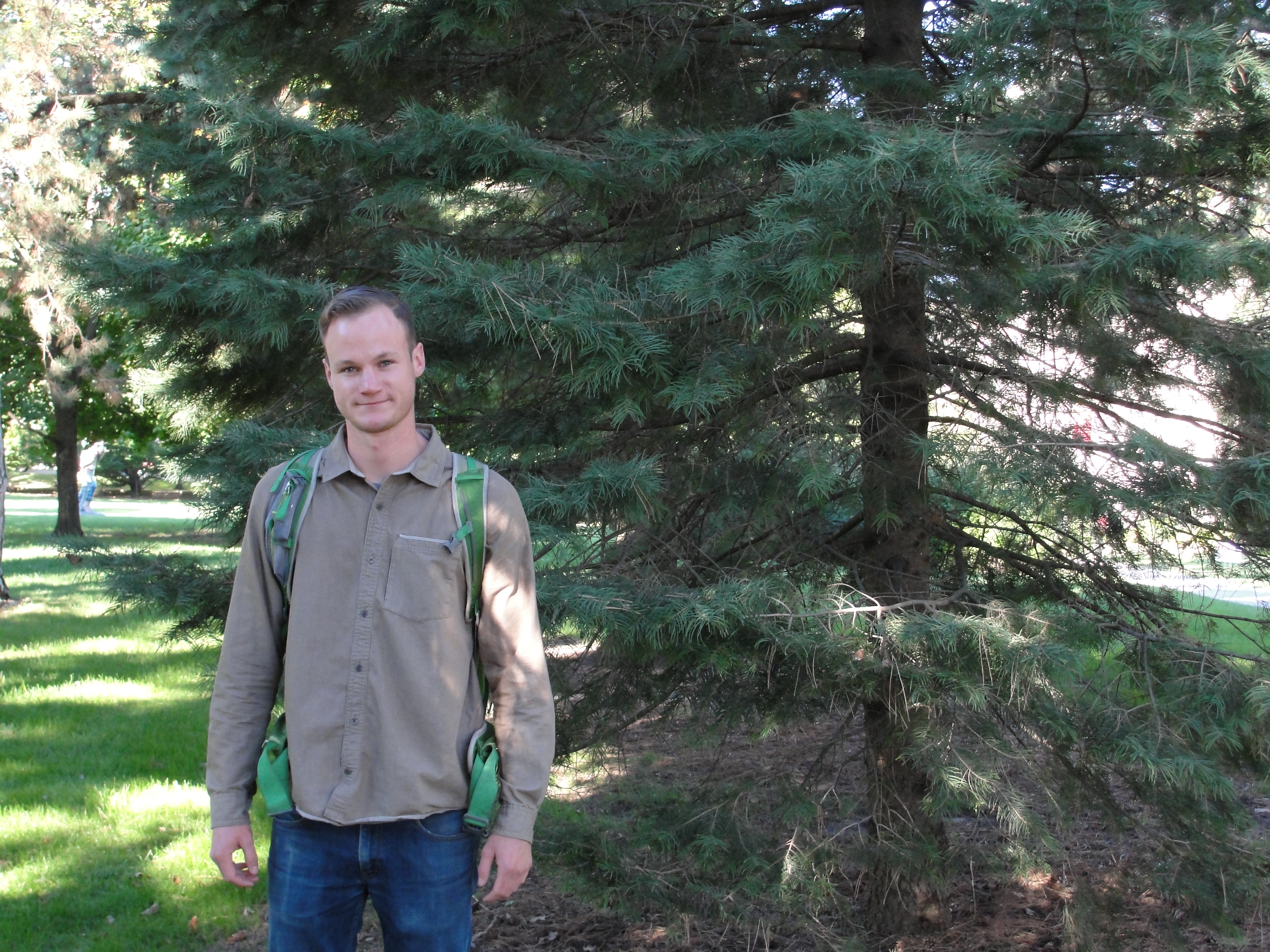
Lawrence’s proposed research encompasses nitrate contamination in agricultural systems. It is titled ‘Denitrification in Agricultural Depressions by Nitrate Isotope Analysis’.
“The question that this grant targets is ‘to what extent are low-lying areas in fields, which are common across the Midwest, functioning as intermittent wetlands which remove nitrate pollution from water and how much of the nitrate removed is reduced nitrous oxide, a powerful greenhouse gas,’” Lawrence says.
Associate Director of the IWC Melissa Miller says, “Water Resources Research Institutes like the Iowa Water Center were authorized by Congress in part to address emerging water resources concerns through research.”
This grant will allow Lawrence to quantify how much denitrification removes nitrate before it flows to tile lines and ultimately surface waters. Lawrence’s theory is that low-lying areas in agriculture fields may remove nitrate before it ends up in the stream, acting as intermittent wetlands embedded in agriculture fields.
Miller says, “Landscape depressions are very evident with wet seasons, like we saw in fall 2018 and spring 2019, and research like Mr. Lawrence’s project is imperative for determining how we manage low-lying areas. The results could impact both water quality downstream as well as decision-making for in-field profitability.”
Get to Know Nate Lawrence, Graduate Student at Iowa State University
Lawrence is originally from a town in central Illinois called Monticello. He completed his undergraduate degree at the University of Illinois, where his interest in research took off.
“My undergraduate research at the University of Illinois also focused on soil nutrient cycling, which led me to my current research questions,” Lawrence says.
His research focuses on climate change and water pollution because he feels, “They are defining scientific questions with potential to address major environmental problems.”
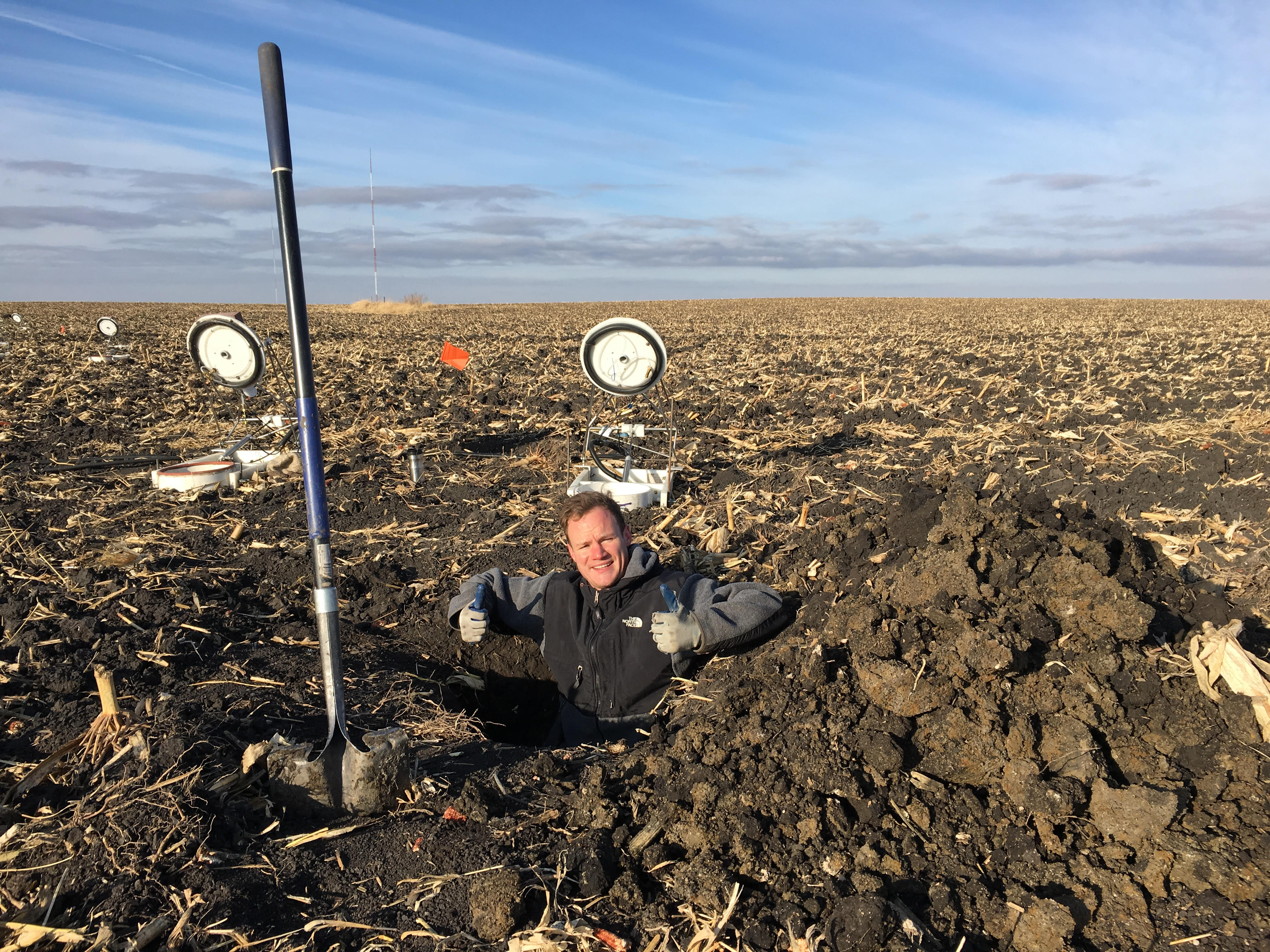
This topic brought him to Iowa because, “The Midwest is responsible for a large percentage of the world’s nitrous oxide emissions. These emissions are coupled to processes that produce nitrate pollution in water. So, Iowa is a fruitful place to look into soil nitrogen processes,” he says.
Lawrence is looking forward to connecting his two areas of study, water and greenhouse gases. He says, “It’s an interesting research project because it combines two areas of my research and may help clarify the processes of both.”
Lawrence describes his research colleagues at Iowa State University as, “…an inviting community with cutting-edge research, collaboration, and professional opportunities.” The Department of Evolution and Organismal Biology at Iowa State University has helped Lawrence thrive in his area of study.
In his free time, Lawrence enjoys being outside in a non-research capacity. Gardening, fishing, and hunting are a few of his favorite outdoor activities.
For more information about this year’s recipients, please visit: https://iawatercenter.wordpress.com/. To reference the general press release for all four recipients, please visit: http://www.water.iastate.edu/news/iowa-water-center-announces-2019-grant-recipients.
The Iowa Water Center is a federally funded organization, part of the National Institutes for Water Resources. Located on the Iowa State University campus, it is one of 54 institutes located throughout the United States and U.S territories. The purpose of the Iowa Water Center is to identify water-related research needs, provide outreach and education opportunities, and disseminate information about Iowa’s water resources to the public to form better policies and everyday practices. Learn more at https://www.water.iastate.edu/.

Sarah Feehan is the communications specialist for the Iowa Water Center. She holds a BS in Journalism and Mass Communication with a minor in Political Science from Iowa State University. In fall of 2019, Feehan will begin acquiring her JD from Drake Law School.
Ask a Scientist – Harmful Algal Blooms
We ask Dr. Elizabeth Swanner at Iowa State University the question: What makes harmful algal blooms so colorful?
Continue readingResearcher Profile: Elizabeth Swanner
Get to know Elizabeth Swanner, an Assistant Professor in the Department of Geological and Atmospheric Sciences at Iowa State University.
Continue reading